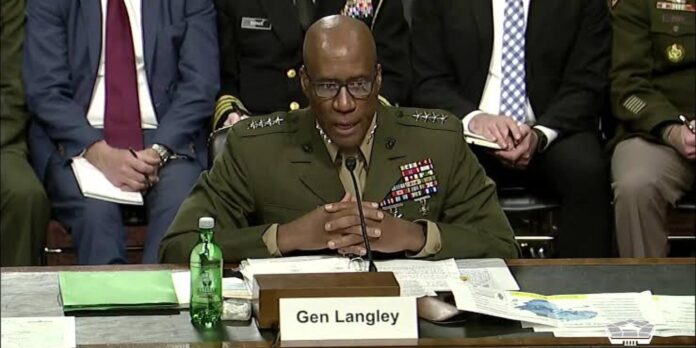The United States Commander of the African Command (AFRICOM), General Michael Langley, arrived in Nigeria on November 13, 2024, for a pivotal meeting with top Nigerian defence officials. The visit aimed at reinforcing bilateral ties and discussing strategies for combating the growing threat of insecurity in Nigeria and the wider West African region.
Langley, who was accompanied by the U.S. Ambassador to Nigeria, Mr. Richard Mills, met with the Chief of Defence Staff (CDS), General Christopher Musa, at the Nigerian Defence Headquarters in Abuja.
During the high-level meeting, Langley spoke extensively on the ongoing fight against terrorism, banditry, and other forms of criminality that have plagued Nigeria in recent years. He commended the Nigerian government for its strategic efforts in tackling these security challenges, highlighting the country’s leadership role in maintaining peace and stability in the African sub-region.
“Your government’s approach to fighting insecurity is commendable,” Langley said, adding that Nigeria’s military strategy has been pivotal in the broader fight against terrorism across West Africa. He also praised the leadership of General Musa, particularly his recent appointment as the Chairman of the Committee of the Economic Community of West African States (ECOWAS) Chiefs of Defence Staff, noting that this would further strengthen regional cooperation on defense matters.
Langley’s visit comes at a time when Nigeria faces increasing threats from insurgent groups, including Boko Haram, ISWAP, and banditry, particularly in the northern and northwestern parts of the country. Despite significant efforts by the Nigerian military, insecurity remains a major concern for both the government and citizens alike.
In response, General Musa expressed his gratitude for Langley’s visit and acknowledged the United States’ unwavering support in Nigeria’s fight against terrorism. He reiterated the commitment of the Armed Forces of Nigeria (AFN) to work with neighbouring countries and global allies to eradicate terrorism and other criminal activities threatening the region.
“We are grateful for your support, and we remain committed to collaborating with the international community to tackle insecurity,” General Musa said. He emphasised the importance of continued cooperation with the U.S., particularly in areas like training, intelligence sharing, and access to defense equipment.
As part of his remarks, General Musa underscored the need for enhanced defence cooperation, which he believes is essential in the fight against terrorism and transnational organised crime. He specifically called for greater collaboration in intelligence-sharing initiatives, which have been shown to play a crucial role in countering insurgent activities.
Furthermore, Musa emphasised the importance of acquiring advanced defence platforms and military hardware from the U.S. to bolster Nigeria’s military capabilities. “We need easier access to relevant defence platforms to effectively confront the security challenges facing our country,” he stated.
The U.S. has also played a key role in providing humanitarian aid to Nigerians displaced by terrorism, offering support to millions of civilians affected by the violence in the northeast and northwest regions of the country. This visit signals a continued commitment to Nigeria’s security and stability, which is seen as crucial not only for Nigeria but for the entire West African region.
The challenges facing Nigeria in the fight against insecurity are daunting, with many analysts describing the situation as a complex and multifaceted problem. The country’s armed forces are overstretched, and the insurgents they face are often well-equipped and elusive. The collaboration with the U.S. military, therefore, remains an essential aspect of Nigeria’s defence strategy.
While Langley’s visit was largely centred around defence cooperation, it also highlighted the broader geopolitical and strategic interests that both countries share in ensuring the stability of West Africa. Both nations recognise that a stable Nigeria is critical to the overall peace and prosperity of the African continent.

